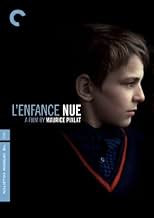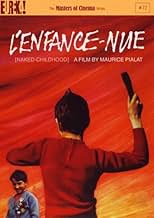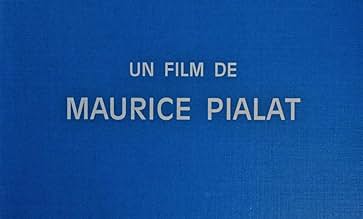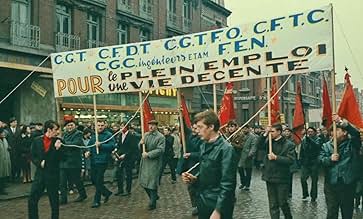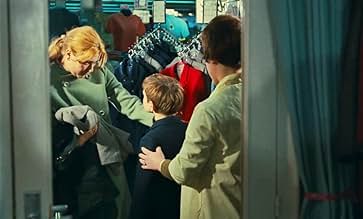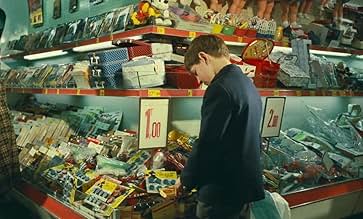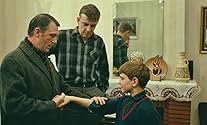CALIFICACIÓN DE IMDb
7.4/10
2.8 k
TU CALIFICACIÓN
Agrega una trama en tu idiomaAn anguished foster child takes to mischief and lies as his foster parents do their best to love and care for him. But it might be too little, too late in this emotionally devastating portra... Leer todoAn anguished foster child takes to mischief and lies as his foster parents do their best to love and care for him. But it might be too little, too late in this emotionally devastating portrayal of the orphaned child.An anguished foster child takes to mischief and lies as his foster parents do their best to love and care for him. But it might be too little, too late in this emotionally devastating portrayal of the orphaned child.
- Dirección
- Guionistas
- Elenco
- Premios
- 1 premio ganado y 1 nominación en total
- Dirección
- Guionistas
- Todo el elenco y el equipo
- Producción, taquilla y más en IMDbPro
Opiniones destacadas
Arlette Langmann and Maurice Pialat wrote the screenplay for "Naked Childhood" and Pialat himself directed this film. In many ways, it is reminiscent of the story of Antoine Doinel in Truffaut's film "The 400 Blows", as it follows a neglected child through the foster care system--a very grim one indeed. Apparently, the story was inspired by an actual child who was raised by foster parents Marie-Louise and René Thierry--two folks who the director asked to appear in this film as the elderly foster parents.
This is the story about a young boy who was given up by his mother to the foster care system. The child, François (Michel Terrazon) acts out in response to being rejected in his first foster home--and as a result, is passed on to another foster home. The bottom line is that the boy has learned to be angry and violent and he appears to be headed for disaster unless something changes very quickly. Is there any hope for the kid? Can the elderly couple get through to him? This is an unusual film because it does not feature non-stop action and suspense. Sometimes the film is a bit slow--but not in a bad way--more like real life. It also features a little boy who is far from perfect but who is not constantly bad, either--he's more amoral than anything else. I liked this, as life is very rarely black & white--though it frequently is in movies. And, the film really doesn't have an ending. Because of this, the film feels more like a slice of life than a movie--which is pretty typical of the French New Wave style of the 1960s. It's probably not the sort of thing the average viewer would like, but it is a quality production. While this sort of thing does not make for the most pleasant viewing, having worked in the welfare system myself many years ago, I can certainly relate to the story of the boy--having seen kids passed on from one home to another to another. It's really no wonder the kids often act out and what is amazing is that many don't!
This is the story about a young boy who was given up by his mother to the foster care system. The child, François (Michel Terrazon) acts out in response to being rejected in his first foster home--and as a result, is passed on to another foster home. The bottom line is that the boy has learned to be angry and violent and he appears to be headed for disaster unless something changes very quickly. Is there any hope for the kid? Can the elderly couple get through to him? This is an unusual film because it does not feature non-stop action and suspense. Sometimes the film is a bit slow--but not in a bad way--more like real life. It also features a little boy who is far from perfect but who is not constantly bad, either--he's more amoral than anything else. I liked this, as life is very rarely black & white--though it frequently is in movies. And, the film really doesn't have an ending. Because of this, the film feels more like a slice of life than a movie--which is pretty typical of the French New Wave style of the 1960s. It's probably not the sort of thing the average viewer would like, but it is a quality production. While this sort of thing does not make for the most pleasant viewing, having worked in the welfare system myself many years ago, I can certainly relate to the story of the boy--having seen kids passed on from one home to another to another. It's really no wonder the kids often act out and what is amazing is that many don't!
It is quite extraordinary that 1968's L'Enfance Nue (or Naked Childhood) was the debut feature of a 43 year-old Maurice Pialat. Pialat would go on to direct a small number of highly-admired films after this, up until 1995, but it remains this film that he will be most remembered for. Similar in spirit but not in style to Francois Truffaut's masterpiece The 400 Blows, it follows the exploits of a troublemaking child who channels all of his rejection into ferocious anger that causes havoc with the people around him. Truffaut also has a co-producer credit for the film, although it would be the last time he would work with Pialat.
A young boy, Francois (Michel Terrazon), is placed in a home for bad children when his frequent outbursts and often psychopathic acts become too much for his mother. He is eventually re-homed and put into the care of an elderly couple, who also look after another older child, Raoul. When Francois warms to the elderly lady, his behaviour begins to become less hostile and he becomes familiar with his new surroundings. But a lifetime spent being unwanted has left it's mark on Francois, and he constantly remains unpredictable. Francois kills a cat, throws a knife at his new 'brother', and repeatedly steals from the other children. He is a horrific creation, and every parent's nightmare.
Pialat paints an interesting picture of France at the time. Without sledgehammering it home, he and the film depicts a time where a creeping poverty was lurking among the edges of suburbia. Perhaps this was one of the factors for Francois' parents being physically and mentally unable to keep the child, too distracted with their own situation that they don't have the time to get to the root of the problem. Or perhaps Francois is just a mischievous little bastard, and his inability to settle with one family before pushing them over the edge is his fault. L'Enfance Nue also has a surprisingly reserved depiction of the social services. They are seen simply doing their job, and repeatedly re- housing Francois every time he is rejected by a new foster family. This is where the genius lies in this film. Instead of using the film as a medium to send a social message (a la Ken Loach), Pialat sits back, points his camera, and tells a story. It is both complex and simple, but you would have to make your own mind up about that.
Much like Jean-Pierre Leaud in The 400 Blows, Michel Terrazon is fantastic in the lead role, brimming with menace and an unpredictability. Although the comparisons seem obvious, it would be wholly unfair to carry on comparing this to Truffaut's film, as L'Enfance Nue is a fantastic film in it's own right. Like most of his films, this is considered somewhat autobiographical to Pialat, but how much is unclear. His filmmaking techniques seem similar to the attitudes of the title character - this film is in your face and hard-hitting. You can almost hear the director yelling 'if you don't like it, then f**k you!'. A very, very good film, and I shall be seeking out more Pialat because of it. A remarkable debut.
www.the-wrath-of-blog.blogspot.com
A young boy, Francois (Michel Terrazon), is placed in a home for bad children when his frequent outbursts and often psychopathic acts become too much for his mother. He is eventually re-homed and put into the care of an elderly couple, who also look after another older child, Raoul. When Francois warms to the elderly lady, his behaviour begins to become less hostile and he becomes familiar with his new surroundings. But a lifetime spent being unwanted has left it's mark on Francois, and he constantly remains unpredictable. Francois kills a cat, throws a knife at his new 'brother', and repeatedly steals from the other children. He is a horrific creation, and every parent's nightmare.
Pialat paints an interesting picture of France at the time. Without sledgehammering it home, he and the film depicts a time where a creeping poverty was lurking among the edges of suburbia. Perhaps this was one of the factors for Francois' parents being physically and mentally unable to keep the child, too distracted with their own situation that they don't have the time to get to the root of the problem. Or perhaps Francois is just a mischievous little bastard, and his inability to settle with one family before pushing them over the edge is his fault. L'Enfance Nue also has a surprisingly reserved depiction of the social services. They are seen simply doing their job, and repeatedly re- housing Francois every time he is rejected by a new foster family. This is where the genius lies in this film. Instead of using the film as a medium to send a social message (a la Ken Loach), Pialat sits back, points his camera, and tells a story. It is both complex and simple, but you would have to make your own mind up about that.
Much like Jean-Pierre Leaud in The 400 Blows, Michel Terrazon is fantastic in the lead role, brimming with menace and an unpredictability. Although the comparisons seem obvious, it would be wholly unfair to carry on comparing this to Truffaut's film, as L'Enfance Nue is a fantastic film in it's own right. Like most of his films, this is considered somewhat autobiographical to Pialat, but how much is unclear. His filmmaking techniques seem similar to the attitudes of the title character - this film is in your face and hard-hitting. You can almost hear the director yelling 'if you don't like it, then f**k you!'. A very, very good film, and I shall be seeking out more Pialat because of it. A remarkable debut.
www.the-wrath-of-blog.blogspot.com
François Fournier (Michel Terrazon) is a ten-year old boy dumped into the foster care system in France by his single mother, whom the film suggests was mentally ill. Maurice Pialat's first feature L'enfance nue is an unsentimental look at the foster care system in France and its effects on those in its care. Written by Maurice Pialat and Arlette Langmann and performed by non-professional actors with much of the dialogue unscripted, L'enfance nue comes from the director's own experience of being raised by his grandparents and the emotional distance he felt towards his biological mother and father. Though the film lacks peak dramatic moments and emotional payoffs, in its volatile main character; it captures the essence of humanity, in all of its contradictions.
François personifies that ambivalence. He can be goodhearted and mean-spirited, cruel and kind, angry and loving, a cauldron of emotions that are sometimes hidden below the surface and sometimes acted out. Like most children, he is inarticulate and is at a loss to explain his actions, but the film does not seek any explanation. It just observes rather than judges. As the film opens, we see a protest march about economic conditions, but we soon learn that this is not a political statement, only a suggestion of the socio-economic area in which the film is set. François is living in the home of foster parents Simone (Linda Gutemberg) and Roby Joigny (Roual Billerey) who are unable to have their own children.
We see him steal a watch, then flush it down the toilet, dropping his foster sister Josette's (Pierrette Deplanque) cat down a stairwell, refusing to eat, and peeing on the floor around his bed. Unable to cope, his foster parents deliver him back to Social Services but, again confounding our expectations, François lovingly buys a gift for his foster mother and seems genuinely sad about leaving. After a revealing scene at the adoption center where prospective parents size up the orphans in a way that reminded me of the slave auction in "12 Years a Slave," François is placed in the home of an older couple, the Thierry's (Marie-Louise and René Thierry, real-life foster parents) whom he calls Grandma and Grandpa.
Also in the home are Raoul (Henri Puff), a teenage foster child, a younger girl, and Mrs. Thierry's elderly mother Nana (Marie Marc), who is mostly confined to bed. François responds to the tenderness shown by Nana who reads to him, sings songs with him, and talks about her life. They even discuss the meaning of the word "mistress." We think there is progress when he shows a sense of guilt for the first time after he steals Nana's coin purse and then quietly puts it back under her pillow. François is also drawn to Grandpa and spontaneously kisses him after he hears stories about the old man's activities with the French Resistance during World War II.
Eventually, however, even the Thierry's begin to question his normality after he throws a knife at Raoul, deliberately spills soup on his brother's lap, smokes cigarettes and hangs out with his neighborhood toughs who together decide to throw iron bars at passing cars from an elevated bridge, an adventure that leads to serious consequences. With his very expressive eyes that seem to look right through you, Michel Terrazon is remarkable as the young man acting out his anger. Others are notable as well including Henri Puff's as young Raoul, but it is Terrazon's memorable performance that remains with us and haunts our dreams.
François personifies that ambivalence. He can be goodhearted and mean-spirited, cruel and kind, angry and loving, a cauldron of emotions that are sometimes hidden below the surface and sometimes acted out. Like most children, he is inarticulate and is at a loss to explain his actions, but the film does not seek any explanation. It just observes rather than judges. As the film opens, we see a protest march about economic conditions, but we soon learn that this is not a political statement, only a suggestion of the socio-economic area in which the film is set. François is living in the home of foster parents Simone (Linda Gutemberg) and Roby Joigny (Roual Billerey) who are unable to have their own children.
We see him steal a watch, then flush it down the toilet, dropping his foster sister Josette's (Pierrette Deplanque) cat down a stairwell, refusing to eat, and peeing on the floor around his bed. Unable to cope, his foster parents deliver him back to Social Services but, again confounding our expectations, François lovingly buys a gift for his foster mother and seems genuinely sad about leaving. After a revealing scene at the adoption center where prospective parents size up the orphans in a way that reminded me of the slave auction in "12 Years a Slave," François is placed in the home of an older couple, the Thierry's (Marie-Louise and René Thierry, real-life foster parents) whom he calls Grandma and Grandpa.
Also in the home are Raoul (Henri Puff), a teenage foster child, a younger girl, and Mrs. Thierry's elderly mother Nana (Marie Marc), who is mostly confined to bed. François responds to the tenderness shown by Nana who reads to him, sings songs with him, and talks about her life. They even discuss the meaning of the word "mistress." We think there is progress when he shows a sense of guilt for the first time after he steals Nana's coin purse and then quietly puts it back under her pillow. François is also drawn to Grandpa and spontaneously kisses him after he hears stories about the old man's activities with the French Resistance during World War II.
Eventually, however, even the Thierry's begin to question his normality after he throws a knife at Raoul, deliberately spills soup on his brother's lap, smokes cigarettes and hangs out with his neighborhood toughs who together decide to throw iron bars at passing cars from an elevated bridge, an adventure that leads to serious consequences. With his very expressive eyes that seem to look right through you, Michel Terrazon is remarkable as the young man acting out his anger. Others are notable as well including Henri Puff's as young Raoul, but it is Terrazon's memorable performance that remains with us and haunts our dreams.
10bob998
Well... Les 400 coups has been placed at no. 140 in IMDb's list of all-time great films, and as much as I admire Francois Truffaut's work, I am more impressed by L'Enfance nue, Pialat's first film, made when he was 43. Owing to the vagaries of the distribution system, I never saw it when it first appeared, and am now able to write about it thanks to TFO's enlightened film series.
Pialat was a realist, maybe to the point of turning off his audiences. If you have seen A nos amours or Loulou, you know you're in for a gruelling experience. Actors pushed to the breaking point, cutting that puts you right in the action, without any establishing background. The scene between Francois and Raoul, where the latter gets out of bed to look for Francois, then the knife slams into the door, just missing Raoul's head by inches, is unforgettable.
The actors are mostly amateurs; they do not try to attract your attention with gestures or speech, they just settle in and tell the story. The "assistance publique" workers are sympathetically rendered: there's no hint of Pialat trying to settle scores with government agencies (cf Une si jolie petite plage). The Minguet family, the second one we see--how many have there been in all?--is beautifully drawn. Just to watch Madame bringing soup to Meme, arranging the clothes, the napkin, it's a marvel of observation. The story hinges on Francois, of course, and his performance is angry, violent, joyous, destructive--he's Pialat's alter ego, I can't help but feel.
Pialat was a realist, maybe to the point of turning off his audiences. If you have seen A nos amours or Loulou, you know you're in for a gruelling experience. Actors pushed to the breaking point, cutting that puts you right in the action, without any establishing background. The scene between Francois and Raoul, where the latter gets out of bed to look for Francois, then the knife slams into the door, just missing Raoul's head by inches, is unforgettable.
The actors are mostly amateurs; they do not try to attract your attention with gestures or speech, they just settle in and tell the story. The "assistance publique" workers are sympathetically rendered: there's no hint of Pialat trying to settle scores with government agencies (cf Une si jolie petite plage). The Minguet family, the second one we see--how many have there been in all?--is beautifully drawn. Just to watch Madame bringing soup to Meme, arranging the clothes, the napkin, it's a marvel of observation. The story hinges on Francois, of course, and his performance is angry, violent, joyous, destructive--he's Pialat's alter ego, I can't help but feel.
Loyal viewers of French cinema would agree if one were to claim that to a very large extent film directors in France tend to take their inspirations from events which have had significant impact on their lives. This is also the case with two directors associated with this film namely Maurice Pialat and François Truffaut who experienced troubled times during their individual childhoods. In Maurice Pialat's Naked Childhood / L'Enfance Nue, the viewers get a first hand view of the tough times faced by some French parents who raise adopted children. As far as the 'nakedness' of the film's title is concerned, it has a lot to do with the brutal, direct and frank portrayal of one adopted boy who is rejected by all and sundry due to his bad behavior and mood swings. Maurice Pialat has avoided any kind of sentimentality as his film is for both parents and children. The focus is more on recognizing a child as an individual, a type of human being who deserves to be understood. Although the major focus in this film is about a 'difficult' child, a kind of emotional balance is created as its story has been told from the point of view of a second adopted child and other adults who have become a part of these boys' lives.
¿Sabías que…?
- TriviaMarie-Louise Thierry and René Thierry were real life foster parents. Maurice Pialat became acquainted with the couple and cast them in lead roles after he began researching the plight of children in the foster care system.
- ConexionesFeatured in Il tempo che ci vuole (2024)
Selecciones populares
Inicia sesión para calificar y agrega a la lista de videos para obtener recomendaciones personalizadas
- How long is Naked Childhood?Con tecnología de Alexa
Detalles
Taquilla
- Total a nivel mundial
- USD 1,993
- Tiempo de ejecución1 hora 23 minutos
- Mezcla de sonido
- Relación de aspecto
- 1.66 : 1
Contribuir a esta página
Sugiere una edición o agrega el contenido que falta

Principales brechas de datos
By what name was L'enfance nue (1968) officially released in Canada in English?
Responda
